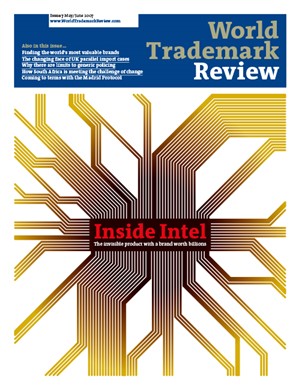-
News & Analysis
-
-
- Categories
- News & Analysis
- Legal Updates
- Long Reads
- Opinion
-
-
- Reports
- Data & Tools
-
Rankings
-
-
- WTR 1000
- Introduction
- All firms
- All individuals
-
- WTR 300
- Introduction
- Individual rankings
-
- Law firm leaders
- EUIPO Filing Elite
- The Global IP Awards
- WTR Global Leaders
-
- WTR Analytics
- WTR 1000 Analytics
-
-
-
Insight
-
-
- Insight
- Guides
- Reviews
- Market Insight
-
-
-
Events
-
-
- Events
- WTR Events
- Diary
-
-
-
- Login | Register

![]()
WTR 07
Digging deep for true brand value
There is nothing new in listings that purport to show
the world’s most valuable brands. But in the eyes of
many, what they have lacked up to now is real
technical credibility. However, a recently released
evaluation study is much more detailed and
comprehensive than what has come before
David Haigh and Michael Rocha
Download
Columns
The view online‘.asia’ prepares for summer launch
The latest regional domain, ‘.asia’, isgearing up to launch. Mark ownersshould be aware of the registration rulesand schedule to make the most of thisnew space – and avoid leaving the dooropen to cybersquatters
Trademark managementWhat to expect from the well-known marks doctrine
The well-known marks doctrine providessome protection to owners of well-knownunregistered or foreign marks. However,mark owners should be aware that not allcountries apply the doctrine to the samedegree
Counterfeiting perspectivesShowdown at the WTO
The Bush administration has initiatedproceedings against the Chinese at theWorld Trade Organization in Genevaover inadequate enforcement of IP rights.In doing so it has raised the stakesconsiderably
Brands from the frontlineThe rollercoaster of pharmaceutical mark development
Trademark clearance is a thanklessbusiness: after spending hours preparingor reviewing search reports and opinions,the only satisfaction the trademarkcounsel often has that the mark was theright choice is if no objection is raisedor lawsuit filed against the mark andhe or she never hears about the markagain. This is true of all trademarks,but even more so of pharmaceuticalmarks, for which clearance involvesextra steps and hurdles
Features
An infamous business proposition
Policing one’s trademark rights from misuse by thirdparties is a legitimate exercise to prevent the markfrom becoming generic. But some unscrupulousparties abuse the law
Branding the invisible
Today Intel is one of the best-known companies onthe planet. While cutting-edge technology has playeda large part in its success, fame has also been drivenby an innovative and ambitious branding strategy
The United Arab Emirates: a centre for Middle East trademark protection
A key trade hub, a booming economy and a commitmentto protecting IP rights mean that the UAE is an importantjurisdiction in which to register and enforce trademarkrights. The creation of a new IP Unit at Dubai Customs isa further sign that the UAE is getting tough on infringers
Gearing up to becoming an IP nation
The Japanese government’s ambition to achieveeconomic growth through the development ofintellectual property puts a lot of pressure on thecountry’s IP office
Rising sun still shining on Japan’s trademark practitioners
Increasing inbound registrations via the MadridProtocol have seen the level of foreign-originatingtrademark work entering Japan diminish over thepast few years. However, the local Japanese marketremains strong
The Madrid Protocol – mysteries and myths
2006 was a bumper year for trademark registrations, particularly registrations made using theMadrid Protocol. However, the impressive figures conceal a lingering mistrust of the protocol in somenon-signatory countries, suggesting that there are still several myths and misapprehensionssurrounding the protocol that need to be dispelled
Taking a match to Fortress Europe?
Earlier this year the Court of Appeal of England andWales upheld – seemingly for the first time – an‘inferred consent’ defence in a parallel import case.Is this a cause for concern for brand owners?
News
Letter to the editor
I am writing in response toarticles that have appearedrecently – including in yoursister publication WorldTrademark Report on March 21– criticizing Part IV of theRussian Civil Code, which willcome into force on January 12008. So is the law an outrightfailure or do the critics missthe point?
Roundtable
Staying ahead in the Rainbow Nation
South Africa is a key jurisdiction for most multinational companies withinterests in Africa. Three specialist practitioners explore some of theissues currently facing trademark owners in the country
Unlock unlimited access to all WTR content